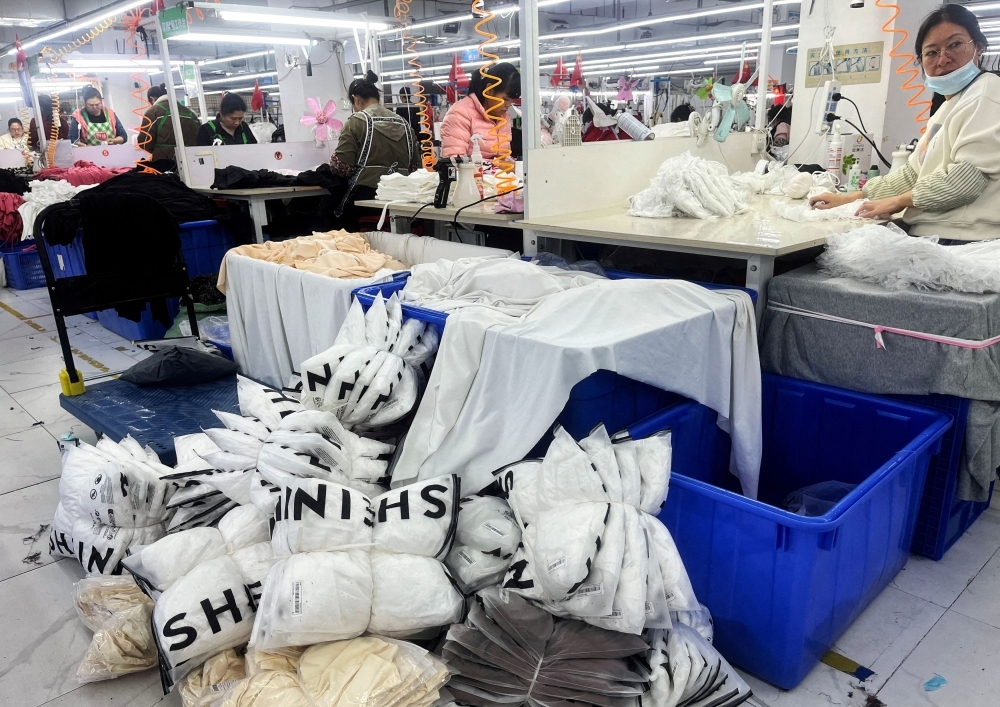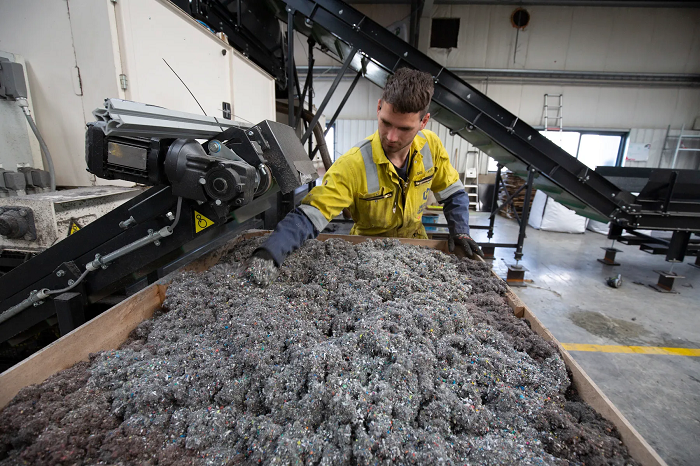FW
OTEXA stats suggest, apparel import values of US have slumped 11 per cent in February ’20. The country imported $5.91 billion worth of apparels in February, 2020 as against $6.66 billion in the same month of the prior year. In volume-terms, USA fell by 12 per cent and imports stood at $2 billion SME. As expected, China’s RMG export to US nosedived drastically by 46 per cent and 36 per cent in values and volumes, respectively.
China exported 579.68 million SME of garments to USA in February which is worth $1.08 billion. Markedly, export of China in value-terms is down by almost half as in February 2019, the shipment valued at $2.01 billion.
Volumes from Vietnam saw marginal surge of 0.3 per cent and shipment of RMG to US valued at $1.06 billion, marking 2.80 per cent growth. Bangladesh maintained its positive performance both in values and SME terms. The country shipped $ 28.47 million worth of RMG to USA in February ’20, noting 4.80 per cent growth on Y-o-Y basis, while volumes – 189.73 million SME – picked up by 7.30 per cent.
India too noted growth in both values and volumes by 4.70 per cent and 7.60 per cent, respectively, in its RMG export to USA in February. USA’s apparel import fell majorly because of China in February but COVID-19 pandemic escalated in other manufacturing destinations as well as US itself from March onwards, which forced buyers to halt their production, forced Governments to impose lockdown and furlough the workers.
Textile associations have appealed to the government to extend the moratorium for repayment of term loans and support to pay wages. Chairman of Confederation of Indian Textile Industry, T Rajkumar says, textile and clothing manufacturing units need one year moratorium to repay loans. In case of interest repayment, the units need at least three months time.
The government should also disburse all the pending incentives under its schemes. It should also look at measures to support those who had taken loans in foreign currencies, face delays in LC payments, and those who have gone in for forward contract. Bangladesh has given a special loan package to textile sector. Banks in India should also have a similar package for the sector.
Apparel Export Promotion Council chairman A Sakthivel too said exporters also need relief under ESI scheme and support to pay wages. The Commerce and Textile ministry officials have been constantly in touch with the stakeholders through video calls.
Nordstrom has witnessed a substantial blow on its business due to the lockdown owing to pandemic. Similarly, the results for quarter ending May 2 and after will be negatively impacted in a momentous manner. It has already taken various mitigation measures to cut costs and raise additional liquidity just like many others. The retailers’ bricks-and-mortar stores have been closed with an uncertain reopening date.
Going with the current trend, Nordstrom has also furloughed majority of its workforce and suspended its quarterly dividend payment effective from the second quarter of 2020. Additionally, it has drawn down $800 million revolving credit facility and halted share repurchases.
Furthermore, Nordstrom has pulled back its 2020 earnings outlook. Its net sales in fiscal 2019 fell 2.2 per cent to $5.13 billion, while net income fell to $496 million in 2019 that was $564 million in fiscal 2018.
Japan’s Fast Retailing, owner of clothing chain Uniqlo, has slashed its annual outlook citing the impact of the COVID-19 outbreak on China, a key growth market in recent years. The pandemic briefly disrupted Uniqlo's supply chain throughout China and forced it to shut over half of its shops there.
Uniqlo also shut around 170 stores in its home market this week after the Japanese government declared a state of emergency. The company forecast an operating profit of 145 billion yen in the full year through end-August, down from a previous forecast of 245 billion yen.
Its operating profit in the six months through end-February fell 21 per cent from the same period a year earlier to 136.7 billion yen.
UK-based fair trade watchdog Traidcraft Exchange has criticized fashion brands and retailers for failing to honor their contracts as they continued to cancel those or stop payments to suppliers from poorer countries including Bangladesh over the Covid-19 outbreak.
The group described their actions as harassment, which exposed to danger the lives of millions of workers who manufacture products for them. It has called on British fashion brands to put on public record their commitment to honor contracts with suppliers so that workers in poorer countries are paid for work they have already done.
The group says they were noting increasing number of reports that the UK brands were cancelling orders, delaying payment terms and refusing to pay suppliers even for completed goods in countries like Bangladesh, Cambodia, China, India and Vietnam. High-street retailers' store closure policy to adjust to the new reality left millions of people who make clothes and shoes for the UK market destitute, as factories shut down or lay off workers
The Traidcraft Exchange has prepared a proposal for a bailout of garment supply chains through the coronavirus crisis, with immediate, medium and long-term actions. It sets out how action by the international community could help establish social protection floors in countries where garment production takes place.
BGMEA has urged buyers to make their position clear with firm commitments regarding settling of outstanding payments and other issues. The ongoing Covid-19 pandemic and subsequent lockdown across the world has seen Bangladesh lose around $3 billion in the form of cancellations or shipments being held up.
As per the reports from more than 1,100 factories, Bangladesh has lost around $3 billion in the form of cancellation or shipments being held up. Its factories are in serious trouble since it needs to settle the payments of the raw material suppliers and most importantly need to pay salaries to our workers and employees.
BGMEA expects brands to make their position clear by giving firm commitments regarding settling outstanding payments, accepting ready and work in progress stocks, taking responsibilities of confirmed orders for upcoming months, and thus solving the problems amicably with suppliers. Offering unrealistic proposals with regard to payment and shipment terms will not help at all since this will make our workers and factories disproportionately affected.
BGMEA and its members are maintaining close communication with the buyers. It is urging brands to work with us to solve the issues by helping each other.
The European Union (EU) plans to provide €5 million in cash to support garment workers in Myanmar who have been affected by COVID-19. The Myan Ku (Quick Assistance) emergency cash fund will go directly to cut, make, pack (CMP) workers who have lost their jobs as a result of COVID-19 As of end March, over 25,000 workers from more than 40 factories have been laid off, while 350,000 are at great risk of either being suspended without pay or losing their jobs permanently, according to the EU. The industry hires up to 700,000 predominantly female workers across 600 factories.
The Centre for Economic and Social Development (CESD) a Yangon-based think tank says, as much as 40 perc ent of Myanmar’s factories have been severely disrupted by COVID-19, and that one-third of the factories are dependent on the EU market. Factories in the country, especially those that manufacture garments and textiles, had already been facing unprecedented challenges since February as supply of raw materials from China stalled and importers from the West began slashing orders. Cash relief is available to all affected garment workers, regardless of whether the factories are local or foreign-owned.
The Myan Ku fund was mobilised through the EU’s Humanitarian Development Peace Nexus Response Mechanism. SMART Textile & Garments, an EU-funded project on promoting labour and environmental standards in the industry, will implement the fund and cash transfers will be made via Wave Money. Around 80 per cent of the funds will be used to support at least 30,000 to 80,000 workers laid off and driven out of their residences. They will receive K 75,000 per month for April, May and June.
Of the remaining funds, 10 per cent will be used to support 3,000 to 8,000 people who were illegally terminated. These will K125,000 per month. The remaining 10 per cent will be given directly to SME workers via Wave Money.
Formed by Gerber Technology, the PPE Task Force, acquired two new members: Coats, an industrial thread leader, and Elevate Textiles, a global provider of advanced, high-quality products and mission critical textile solutions.
As a part of this collaboration, Coats will use its extensive network of apparel manufacturers and industry leaders to connect the Gerber PPE Task Force to the potential outlets for their products. It will offer them raw materials used for the manufacturing like quality threads, trims, specialist products along with technical support and service for seamless production. Coats will also guide these manufacturers to adhere to PPE regulation.
Under this collaboration, Elevate’s Burlington, American & Efird (A&E), and Gütermann brands will provide the industry with critical barrier fabric and thread components. These are used in the manufacturing of PPE products including masks, isolation gowns and other medical garments.
Burlington’s The Maxima collection of fabrics is known the standard in the industry for reusable isolation and surgical gowns and meets AAMI standards for Levels 1-4 and FDA standards. On the other hand, A&E has RSL approved, critical PPE sewing threads for a multitude of PPE products in its basket.
The National Council of Textile Organizations (NCTO), representing the full spectrum of U.S. textiles from fiber through finished products, issued a statement today from textile executives leading the nation’s unified effort to produce critical personal protective equipment (PPE) to help hospitals and healthcare workers fighting the COVID-19 pandemic.
In factories across the country, textile companies are retooling production virtually overnight to produce PPE products ranging from hospital gowns, face masks and shoe covers to scrubs. The industry is playing a critical role in the nation’s manufacturing strategy and solution to help contribute to the high demand for these products.
U.S. apparel and textile executives, representing the entire supply chain, from fiber to finished apparel, share their involvement in the monumental task of providing PPE products during challenging times.
The quotes—for use in any articles you are developing—from textile and apparel executives below offer a snapshot of efforts throughout the entire supply chain to provide PPE products for our nation.











